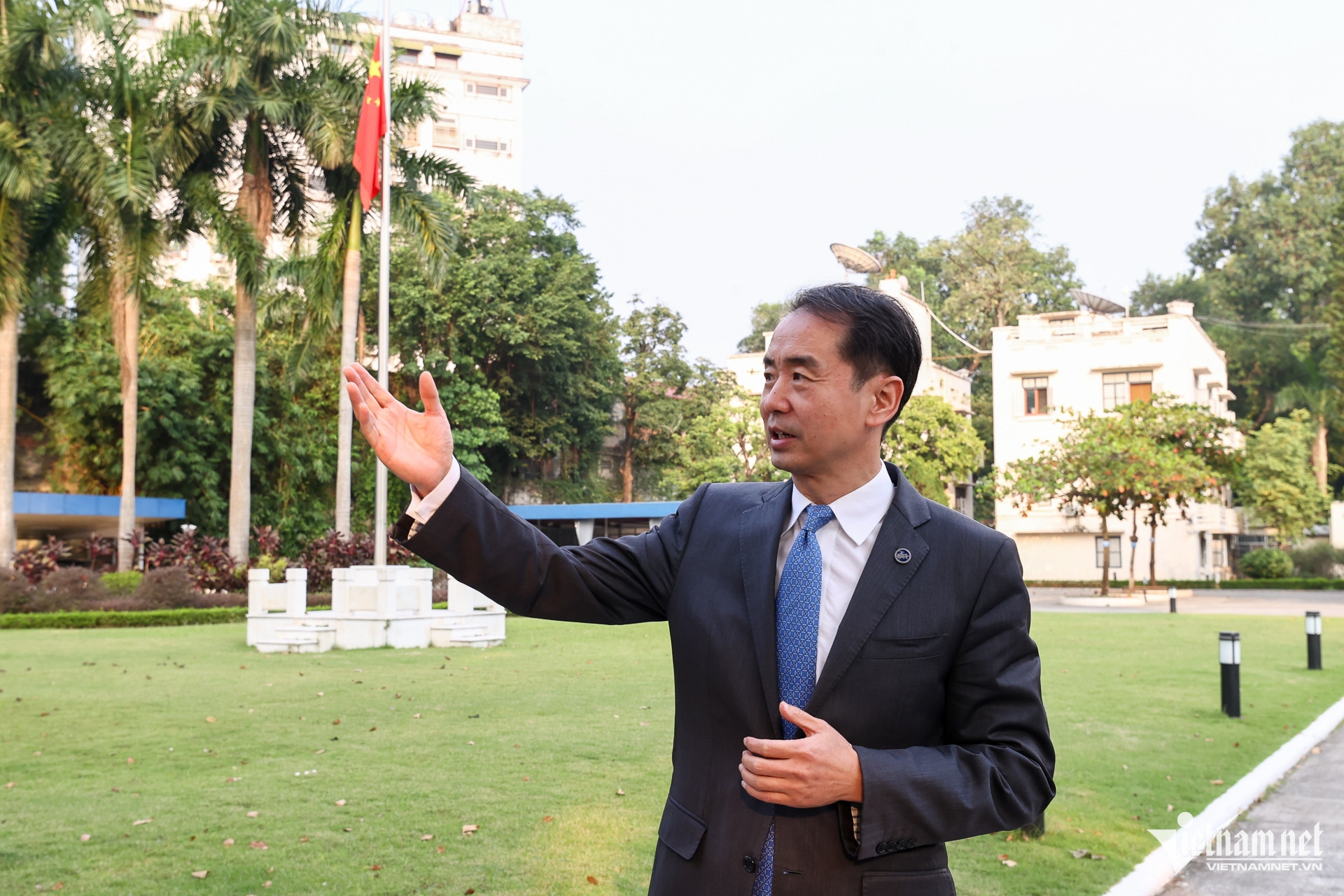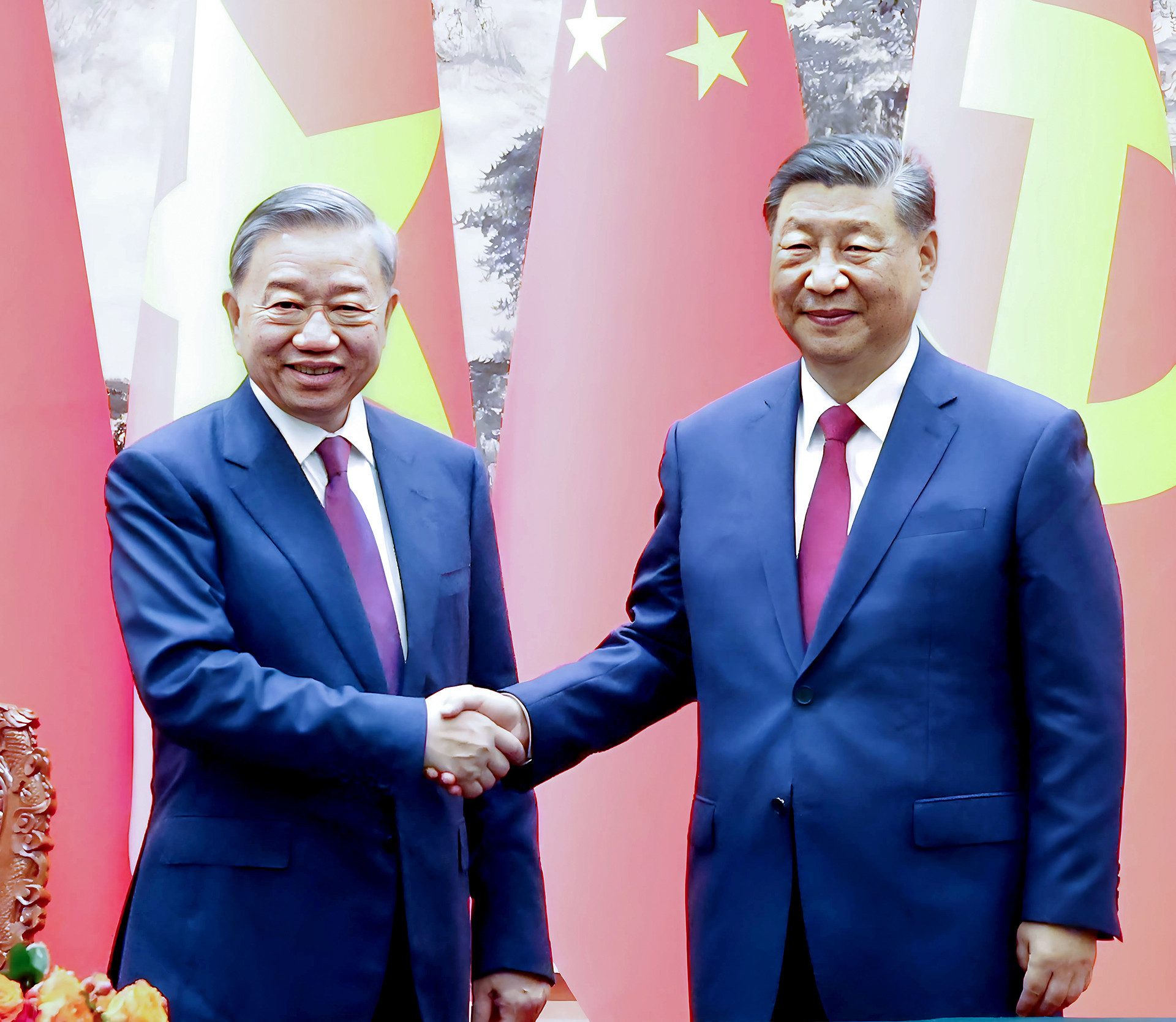Ambassador He Wei expressed this sentiment, emphasizing that Premier Li’s visit occurred exactly one month after he assumed his post in Vietnam. He noted the high regard in which the Vietnamese government and people hold the development of Vietnam-China relations.
Ambassador He Wei reflected on his recent official meetings, including presenting his credentials to General Secretary and President To Lam on September 17, meeting with Prime Minister Pham Minh Chinh on October 1, and his talks with Standing Secretary of the Communist Party Leung Qiang on October 8.
"I was deeply moved by these meetings with Vietnamese leaders. Relations between China and Vietnam are at their best," said Ambassador He Wei.
 |
 |
 |
 |
The ambassador reviewed Premier Li’s meetings with senior Vietnamese leaders, noting the formal welcome ceremony, substantive talks, the signing of a joint statement, and ten cooperative agreements.
On October 14, Ambassador He Wei also had discussions with Deputy Prime Minister and Foreign Minister Bui Thanh Son and other Vietnamese officials at the airport. Both sides agreed that Premier Li’s visit had produced rich results, significantly advancing the strategic construction of a Vietnam-China community with a shared future.
Political trust between the two nations has deepened. Both sides affirmed that the development of China-Vietnam relations is a strategic priority and a mutual choice. They agreed to follow the “Six More” strategic directions set by the top leaders of both the Communist Parties and governments.
Leaders of both nations also agreed to bolster economic and trade cooperation, accelerate the connection of infrastructure such as railways, highways, and border ports, and pilot intelligent border ports.
Regarding railway cooperation, Ambassador He Wei mentioned significant progress, particularly the fast-tracking of feasibility studies for the Lao Cai-Hanoi-Hai Phong standard-gauge railway and the planning of two additional standard-gauge routes: Dong Dang-Hanoi and Mong Cai-Ha Long-Hai Phong.
“With both hard and soft connectivity, such as building interconnected railway systems, I am confident that a new economic corridor will be established for Vietnam through China, connecting to Central Asia and Europe. This will turn northern Vietnam into a gateway for external trade,” Ambassador He Wei explained.

Both nations' leaders also agreed on the importance of enhancing mutual understanding and friendship between the people of China and Vietnam, encouraging cooperation between border provinces.
The two prime ministers also discussed maritime issues candidly, agreeing on the need for better control and resolution of disputes, and to maintain peace and stability in the South China Sea and the region.
Ambassador He Wei highlighted the strategic leadership of the top leaders of both countries as a guiding factor in strengthening Vietnam-China relations. "I have served in multiple countries, but Vietnam-China relations have a unique quality that other nations do not share," he remarked.
Trust and determination will solve all issues
Reflecting on the historical ties between China and Vietnam, which were nurtured by leaders like Ho Chi Minh and Mao Zedong, Ambassador He Wei underscored the special relationship between the two countries.
In 2022, the late General Secretary Nguyen Phu Trong visited China, and in late 2023, Chinese President Xi Jinping made a historic visit to Vietnam. In August 2023, at the Friendship International Border Gate in Lang Son province, the late General Secretary Trong planted a “friendship tree,” symbolizing the enduring Vietnam-China relationship.

The first overseas visit of General Secretary and President To Lam in his new role was to China, demonstrating Vietnam's high regard for its relations with China.
Ambassador He Wei highlighted the positive developments in cooperation, noting that China remains Vietnam’s largest trading partner, with bilateral trade exceeding $200 billion for three consecutive years. In the first eight months of this year, trade reached $167 billion, a 19.2% year-on-year increase. China is also Vietnam’s largest market for agricultural exports.
Ambassador He Wei was particularly impressed by Vietnam’s export of 500,000 tons of fresh durians in 2023, generating $2.3 billion, with 90% of the durians exported to China.
Railway cooperation has also seen notable achievements, with bilateral rail freight breaking records three times in the first seven months of the year. The ambassador expressed optimism about further enhancing cross-border railway systems to strengthen economic connectivity.
While acknowledging the challenges in bilateral cooperation, Ambassador He Wei expressed confidence that with trust, patience, and determination, both sides can resolve any issues.
He also emphasized the potential for people-to-people exchanges, which he described as a “treasure trove” in the bilateral relationship. Currently, around 23,000 Vietnamese students are studying in China, double the pre-COVID-19 number.
In the first eight months of 2024, Vietnam welcomed 2.4 million Chinese tourists, accounting for 21.4% of international visitors, ranking second in tourist arrivals, with over 200 weekly flights between the two countries.
Next year will mark the 75th anniversary of the establishment of diplomatic relations between China and Vietnam. It will also be the “Year of Vietnam-China Cultural Exchange.” Ambassador He Wei hopes to continue fostering traditional friendship, turning people-to-people ties into a “catalyst” for strengthening bilateral relations.
Tran Thuong